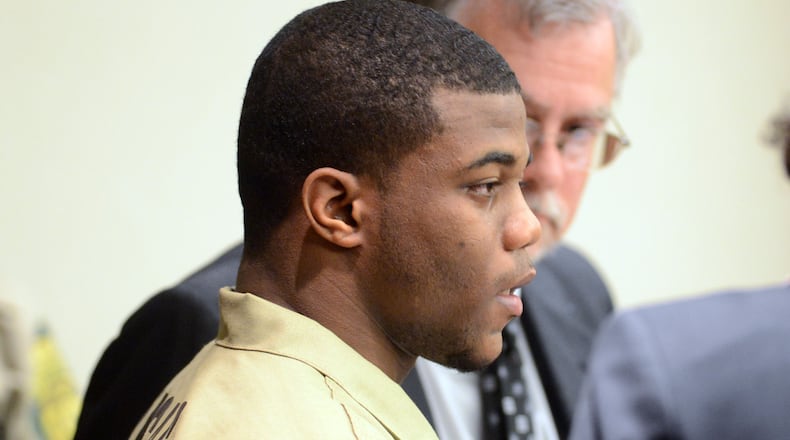The Georgia Supreme Court on Monday upheld the murder conviction against Tracen Franklin for the beating and stomping death of Bobby Tillman in a case that attracted nationwide attention because of its callous and arbitrary nature.
Franklin, 18 at the time of the Nov. 6, 2010, incident, is serving a life sentence without the possibility of parole for the crime. Even though Franklin lost his appeal, the ruling means his lawyers can begin pursuing new claims that contend Tillman’s death was caused by a deputy who administered CPR at the scene, not by Franklin.
Douglas District Attorney Brian Fortner said the evidence against Franklin was overwhelming and he was pleased that the court upheld the conviction. As for the CPR claim, the issue was litigated at trial and “we look forward to responding to this new attack in court in the near future.”
Tillman, then a freshman at Georgia Perimeter College, had been invited to a chaperoned party in Douglas County to celebrate the fact that two of his former classmates had made good grades. But a brawl broke out after the party in which two girls began fighting over a boy.
Emanuel Boykin, one of four men charged in Tillman’s murder, was trying to break up one of those fights when he was hit by one of the girls. Boykin said that because he didn’t hit girls, he would hit the first man he saw. That person happened to be the slightly built Tillman, who was sitting on the trunk of his friend’s father’s Mercedes.
Boykin ran up to Tillman and began punching him, causing him to fall on the ground. Franklin and two other co-defendants — Quantez Devonta Mallory and Damon Coleman — joined in the melee. Witnesses said they saw the four men beat, kick and stomp Tillman, who was later pronounced dead at the hospital. All four co-defendants are serving life-without-parole sentences for the murder.
In its ruling, the state Supreme Court said it found sufficient evidence from Franklin’s trial to justify the jury’s verdict that he was guilty of the murder.
Franklin’s lawyer, Josh Moore, said he was disappointed with the court’s decision. “Now we are looking forward to the opportunity to demonstrate to the trial court that the assault of Mr. Tillman was not the cause of his death,” Moore said.
Tillman died because of a small rupture in the right ventricular wall of his heart. This caused Tillman’s pericardial sac to fill with blood and eventually stop his heart from functioning.
A pending court motion that seeks a new trial for Franklin notes that Tillman suffered from a congenital abnormality that left his ventricular wall one-half to one-third the thickness of a wall in someone with a normal heart.
Ventricular wall ruptures are often caused by broken ribs or cracked sternums in which a jagged or sharp surface punctures the heart, the motion said. But this didn’t happen to Tillman and there were no discernible foot-shaped bruises observed on Tillman’s body. This makes it “highly probable” the wall rupture was caused by a deputy who administered CPR, the motion said.
Peter Block, a cardiology professor at Emory University School’s of Medicine, filed a sworn statement supporting the motion. In an interview, Block said if CPR caused Tillman’s death, the deputy who administered it is not at fault because he was trying to save Tillman’s life and had no idea Tillman had an abnormally thin ventricular wall.
As for the beating causing the rupture, “I don’t know what kind of a stomp there was,” Block said. “But it just didn’t ring true to me that that’s what caused it, particularly with no evidence of rib fractures.”
Vigorous CPR can rupture ventricular walls, particularly abnormally thin ones, Block said. He noted that awareness of such a possibility is evolving at a rapid rate in the medical community.
“This was a tragedy, anyway you look at it,” the cardiologist said. “I don’t think anyone will know for sure what caused the rupture, but I think it was more likely than not CPR.”
If that’s the case, Franklin is in prison “for something he possibly didn’t do,” Block said.
Another problem, Franklin’s court motion said, is that when a GBI medical examiner testified at trial that he did not believe CPR caused the tear in Tillman’s ventricular wall, the examiner based his opinion on false assumptions, thereby misleading the jury.
Franklin’s claims are laid out in an extraordinary motion for a new trial that was filed in late 2016. It was put on hold while Franklin’s direct appeal was pending. Since the state Supreme Court has now ruled, litigation on the new trial motion should proceed fairly soon.
About the Author
The Latest
Featured





